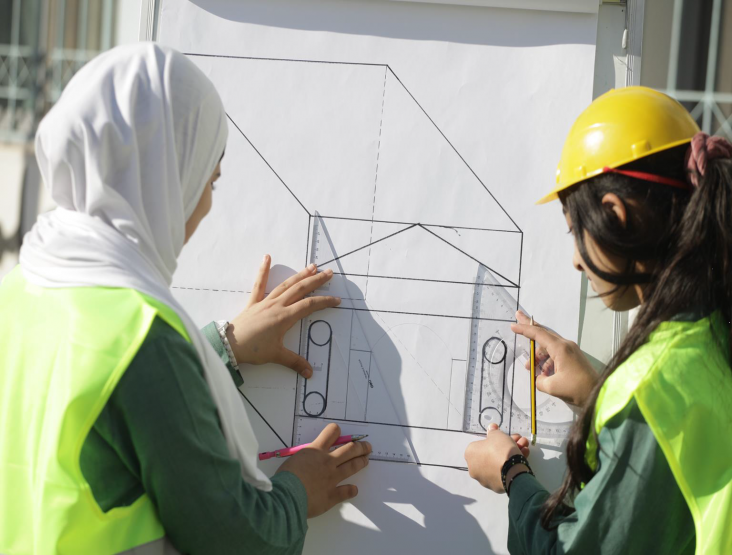
Jordan School Expansion Project
2014-2017 • $45 million • 132 renovations • Partners: Arabtech Jardaneh, Architecture/Engineering design services; Ministry of Public Works & Housing; Ministry of Education; multiple construction firms
Background
Jordan has made steady progress in raising primary education completion rates and eliminating gender disparities in education. Access to education is high: primary net enrollment rates are 90%, while secondary net enrollment rates are 86%. Access to early childhood education has surged over the past several years reaching 38%. UNESCO ranked Jordan 18th out of 94 countries in the “Education for All” rating for gender and education, indicating that Jordan provides equal learning opportunities for males and females. Despite the very high enrollment rates and the availability of access to schools across the Kingdom, the quality of education remains uneven.
Student well-being and school achievement is influenced by various physical and social factors. It is critical to have a safe and healthy environment, both physical (which includes elements such as sanitation facilities, noise, temperature, and lighting as well as biological or chemical agents) and social (social relationships and attitudes) in the schools. Students who feel connected to their schools perform better academically and the quality of relationships within the learning environment (teacher-student and student-student) correlates with students’ capacity to learn effectively. Certain levels of fear or stress can inhibit or stifle a student’s ability to learn. A safe, clean, and well-maintained school with a positive social climate and culture can foster school connectedness which, in turn, boosts student and staff health as well as students’ educational achievement. The need to improve the schools in support of quality-learning environments is one of the Government of Jordan’s priorities.
Project Overview
The Learning Environment: Improved Infrastructure Program (LEIIP) is a $45 million project that aims to improve student well-being and school achievement through improving the physical infrastructure of the learning environment. LEIIP will be implemented by USAID and its key partner Arabtech Jardaneh Engineers and Architects (Arabtech) in full collaboration and partnership with the Ministry of Education (MOE). The construction and renovation will be implemented through host country contracts with the Ministry of Public Works and Housing (MPWH). The project began in November 2013 and will end in October 2017.
The overall project objective is to improve the learning facilities through the renovation of 132 selected MOE schools across Jordan. Specific project objectives include:
- Improve the functionality of schools to achieve better learning quality, through interventions such as:
- Improved circulation and function
- Improved sanitary facilities
- Improved school systems that affect teachers’ and students’ performance such as thermal comfort, air quality, lighting, acoustics, etc.
- Providing limited scope of critical furniture and equipment items that are identified to have a major positive impact on the teacher and student performance
- Enhance the school image through improving the physical appearance of the renovated schools
- Improve the compliance of the selected schools with local accessibility and safety standards
Activities
Planning
- Site Selection: The 132 participating schools were selected from the list of 320 schools that participated in the Learning Environment: Technical Support program. Other selection criteria included site and building ownership by the MOE, located in poor and overcrowded areas, structurally safe, and the willingness and commitment of the school staff and students to maintain the improved school.
- Assessments: Each school is being surveyed to identify all possible needed renovations. An assessment report will be generated, prioritizing renovation needs within the given program budget.
- Design Guidelines and Concepts: Design guidelines are created through engagement with international and local consultants who specialize in the field of education planning and through community workshops with the input of teachers, parents, community members, and students.
Architecture and Engineering Design Development
- Arabtech will use the assessments and design guidelines to prepare the architectural, structural, electrical, and mechanical detailed designs for each school site. They will also prepare documents for the MPWH to use in soliciting construction contractors.
Bidding, Construction and Supervision
- The MPWH will select construction contractors in accordance with USAID and GOJ systems and regulations. The MPWH will then award packages to local construction firms to complete the renovations. Arabtech will supervise all construction and provide detailed monthly reports to USAID on cost, schedule, quality, and any issues that might require the attention of MPWH or USAID.
Post Construction
- Arabtech will develop a school occupancy and operation best practices manual for the schools. All staff will be trained on safety, operation, and utilization of the renovated schools.







Comment
Make a general inquiry or suggest an improvement.